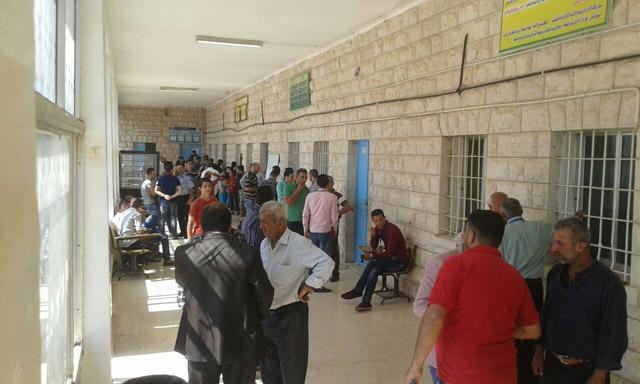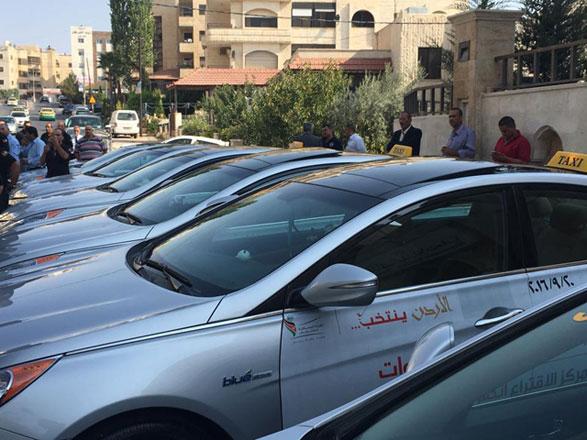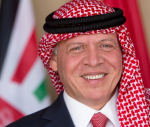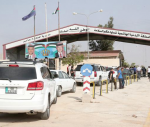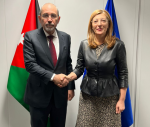You are here
Kinship, geography outweigh political leanings in local polls, say some voters
By Rayya Al Muheisen - Mar 22,2022 - Last updated at Mar 22,2022
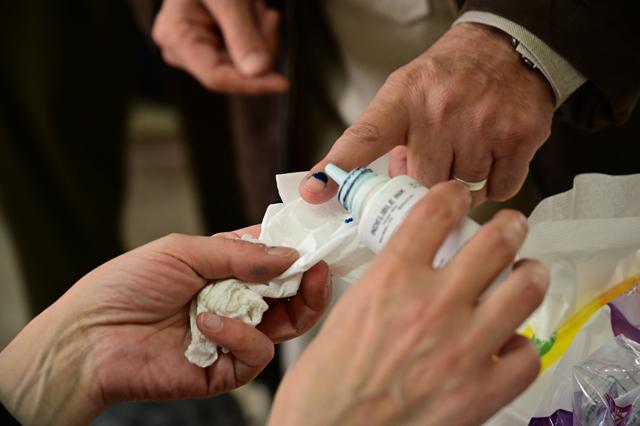
A polling official marks the left forefinger of a voter with indelible ink after he cast his vote during the municipal and governorate council elections at a polling station in Amman on Tuesday (Photo by Amjad Ghsoun)
AMMAN — Jordanians on Tuesday travelled from different governorates to their home towns to elect their representatives at municipal and governorate council elections where tribal and geographical considerations come into play rather than candidates’ platforms, according to voters interviewed by The Jordan Times.
When asked for whom he voted, Abdel Razaq Bdour, a voter from the Tafileh Governorate, cited a common Arabic saying, “Those we know are better than those we don’t know.”
He stated that family is connected by blood and if it was not for his cousin, he would not have travelled from Amman to Tafileh, which is a two-hour drive, to vote. He further said that “all candidates are the same” and he “didn’t believe that anything would change even if the candidate he voted for won”.
“I believe Tafileh is a less privileged governorate,” Bdour stated.
He noted that the infrastructure in his home town is “below standards”, tourism sites are “untouched” and it is “impossible” to find a job there. He also believed the candidates “would do all they could to improve the situation for their community members”.
Ali Masaedeh, a voter from Irbid, said he believed that if the candidate he voted for won, he might be able to make “a slight positive change” in his governorate.
“I don’t know what my candidate’s programme is,” Masaedeh told The Jordan Times.
Meanwhile, many Jordanians took to social media throughout the Kingdom to reflect on the municipal elections, either to promote their favoured candidates or to voice their opinions about elections and in some cases urge people to go out and vote.
Ahmad Habahbeh, a 27-year old whose family is originally from Shobak, stated that differences between regions within the same country affected his willingness to vote.
“I wouldn’t drive for three hours to vote for a representative, even if they were family members,” Habahbeh told The Jordan Times.
“Since we are currently in a digital transformation era, I suggest that the government builds a platform for online elections next municipal or parliamentary elections,” Habahbeh said.
“I did not know what the elections were for,” a person who preferred to remain anonymous told The Jordan Times.
She added that she doesn’t differentiate between the parliamentary and municipal elections. “Candidates serve their potential voters before elections, but once they are elected, they no longer have interest in meeting people who voted for them,” she said.
“I have never voted and I don’t think I ever will,” she said.
“As far as I know, a good number of Jordanians are fed up with the ongoing economic crisis, high unemployment and poverty. People are looking for real change, not hypothetical projects by candidates that will take tens of years to come into action,” she said.
“Candidates should effectively serve their community, I would only vote for a candidate who has proven to serve his or her community,” Lina Odat, a voter in Amman, told The Jordan Times.
Odat said all potential representatives should have an agenda along with their campaign, and representatives should be dismissed from the council if they do not stick to their agenda and pursue the goals required by their community members.
Related Articles
JERASH/AJLOUN — Residents of Jerash and Ajloun on Tuesday braved the hot weather to participate in the twin local elections.The neighbouring
AMMAN — The Independent Election Commission (IEC) on Wednesday published the final lists running in the upcoming Lower House elections, an I
AMMAN — As the Kingdom prepares for the parliamentary elections next month, Jordanian youth are engaging in robust discussions about the sig


